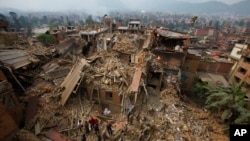Nepal's parliament approved new laws Wednesday to allow the government to spend billions of dollars pledged by foreign donors on reconstruction for hundreds of thousands of people who lost their homes during a devastating earthquake earlier this year.
The laws allow the formation of the National Reconstruction Authority, which will collect and spend money from donors for post-quake reconstruction. Foreign donor agencies and countries have pledged $4.1 billion in aid to help Nepal rebuild after last April's quake.
The authority is supposed to handle the rebuilding of collapsed houses, office buildings, schools, hospitals and roads, and will be empowered to bypass spending rules to get the work done quickly.
Nepal has been criticized for delaying the new laws and the formation of the reconstruction authority because of disagreements among political parties about who will head the agency. The country also has been busy adopting a new constitution, dealing with ethnic protests, coping with severe fuel shortages and electing a new government.
The hundreds of thousands still homeless because of the quake are facing harsh winter weather in Nepal's mountain villages. Many are still living in tents and huts built with tin sheets that will be little match for the snow and below-freezing temperatures.
Nearly 9,000 people were killed in the April 25 earthquake and aftershocks. Nearly a million houses and buildings were damaged.
The government has so far given only 15,000 rupees ($145) per affected family as emergency aid. There was a plan to distribute another 200,000 rupees ($1,923) per family, but that has not happened.
The lack of a functioning government reconstruction agency has stopped both government and nongovernmental aid groups from building homes for the victims because the agency was supposed to come up with the plans and designs for new homes.
Aid groups have warned of a crisis unfolding in Nepal during the winter, especially for many of the estimated 400,000 people who live at elevations of 1,500 meters (4,920 feet) or higher.
Nepal's Parliament Approves Laws for Quake Reconstruction

KATHMANDU, NEPAL —









